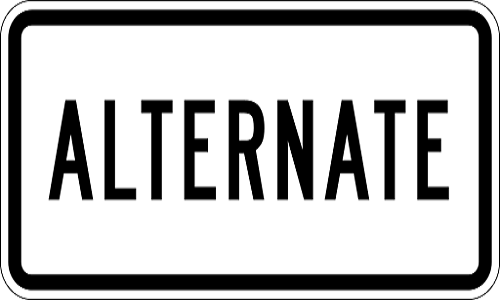Difference Between Alternate And Equivalent
What is the difference between ‘alternate’ and ‘equivalent’? Both words can be used to mean something that is very similar or the same. However, ‘alternate’ can also mean something very different, and if used in place of ‘equivalent’ incorrectly could change the meaning quite a bit. So while the words can be synonyms, the different meanings and usages of the words must be understood.
‘Alternate’ can be an adjective, a transitive verb or a noun. When it is used as an adjective it commonly means something that is occurring in or forming a repeated series, or in other words, something that happens or is there every other time. One time it is one way, but it is not the next time, but happens or is there the following time. For example: She works on alternate days, so she is only in the office on Monday, Wednesday and Friday. ‘Alternate’ as an adjective can also have the meaning of something being other than the usual. In this sense, it is used to mean an acceptable substitution. For example: Because the road was closed, we had to take an alternate route home. When ‘alternate’ is used as a verb, it means to place or do different things so that one follows the other in a repeated series or to take turns at doing something. For example: Please alternate sides when you row the boat, so row on the right side, then the left and after that back on the right side. Finally, when ‘alternate’ is used as a noun, it means a person or thing that is chosen to take another’s place if that person or thing is not there or able to be used. For example: He is the alternate for the job if the first person doesn’t accept it.
‘Equivalent’ is can be used as an adjective. It means having the same value, use, meaning, amount or force. For example: Use an equivalent amount of dirt in each pot. It also takes on the idea of the same or almost identical in effect or function. In this way, if ‘equivalent’ is used as an adjective for a substitution of something, it is just as good as the original. For example: The equivalent of ‘hello’ in Spanish is ‘hola’ Like ‘alternate’, ‘equivalent’ can likewise be used as a noun to mean something that is the same, equal or corresponding or is an acceptable substitution. For example: Use milk or a non-dairy equivalent in the recipe.
‘Alternate’ as an adjective or a noun, but only when it means something that is used in place of the usual, can be used as a synonym to ‘equivalent’. Since ‘alternate’ has a much broader usage and meaning when referring to something that is an equal or is the same in effect, manner or usage, ‘equivalent’ is generally a better word to use, because it only has that meaning. In common usage, ‘alternate’ is generally a less preferable substitution or a second choice, while ‘equivalent’ may be used to show something is no different or just as preferable as the original.
- Difference Between Hold on And Hang on - February 19, 2016
- Difference Between “Give it up” and “Applaud” - February 18, 2016
- Difference Between Condole And Console - February 17, 2016
Read More ESL Articles
Search DifferenceBetween.net :
Leave a Response
References :
[0]http://commons.wikimedia.org/wiki/File:Alternate_plate.svg

